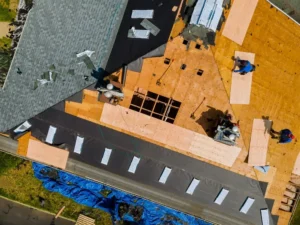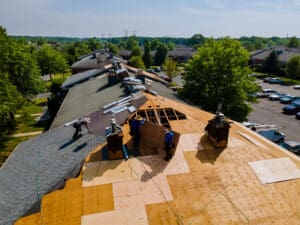Commercial vs. Residential Roofing: Key Differences
Commercial and residential roofing services are two distinct disciplines within the field of roofing. Although they share some similarities, there are key differences that make each one unique. Understanding these differences is crucial when determining the appropriate roofing services for your specific needs. In this blog post, we will delve into the disparities between commercial and residential roofing, shedding light on the distinguishing factors that set them apart.
Roofing Services for Commercial Buildings
Commercial roofing services cater to the needs of businesses, offices, warehouses, shopping centers, and other non-residential structures. These projects typically involve larger roofs that cover substantial areas. Due to the size and complexity of commercial roofs, specialized knowledge and expertise are essential to ensure a successful installation, repair, or replacement.
Roofing Services for Residential Buildings
On the other hand, residential roofing services are tailored to meet the requirements of individual homes, apartments, condominiums, and other residential properties. Residential roofs are generally smaller in scale compared to their commercial counterparts. Roofing contractors specializing in residential projects have a deep understanding of the unique challenges and considerations associated with these types of roofs.
Material Differences
One key difference between commercial and residential roofing lies in the materials used. Commercial roofs often utilize different materials, such as built-up roofing (BUR) and modified bitumen, to withstand the wear and tear of heavy foot traffic, equipment installation, and rooftop system maintenance. On the other hand, residential roofs typically consist of asphalt shingles, metal roofing, or tile roofing. These materials are more aesthetically pleasing and blend with the residential landscape.
Design and Structure
The design and structure of commercial and residential roofs also vary significantly. Commercial roofs are often flat or low-slope to accommodate HVAC systems, rooftop equipment, and easy access for maintenance. These flat roofs require specialized installation techniques and materials to ensure proper drainage and prevent water pooling. In contrast, residential roofs are typically sloped or pitched to allow for efficient rainwater runoff. This design helps protect the home from water damage and helps maintain the overall integrity of the structure.
Code and Safety Regulations
Another crucial difference between commercial and residential roofing lies in the code and safety regulations that govern their installation and maintenance. Commercial buildings must adhere to strict building codes and safety regulations due to the higher occupancy levels and potential risks involved. These regulations dictate the type of materials, fire resistance ratings, and structural requirements that must be met for commercial roofs. Residential roofs also have codes and regulations to follow, albeit less stringent than their commercial counterparts.
Cost Considerations
When it comes to cost considerations, commercial roofing projects are generally more expensive than residential ones. Commercial buildings require specialized materials and installation techniques, leading to higher labor and material costs. Additionally, the sheer size of commercial roofs often requires more extensive maintenance and repairs, further adding to the overall expenses. Residential roofing projects, on the other hand, tend to be more budget-friendly.
Choosing the Right Roofing Contractor
Regardless of whether you require commercial or residential roofing services, it is crucial to choose the right roofing contractor. Look for a reputable company with extensive experience and a track record of delivering quality workmanship. The contractor should possess the necessary licenses, insurance, and certifications to ensure compliance with local regulations.
In conclusion, commercial and residential roofing services differ in terms of the buildings they cater to, materials used, design and structure, code and safety regulations, and cost considerations. While both require specialized knowledge and expertise, it is essential to understand these key differences to make an informed decision when selecting the appropriate roofing services for your needs. By choosing a reliable roofing contractor, you can ensure a successful roofing project that not only meets your requirements but also adds value and protection to your property.






